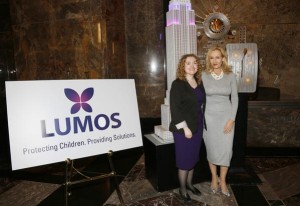“Very Good Lives” now on Sale for Lumos, JKR and Lumos USA
Apr 14, 2015
News
Early this morning, J.K. Rowling tweeted a reminder that her Harvard Commencement address was published today and that all proceeds will go to Lumos.
J.K. Rowling also took a trip to New York City last week to launch Lumos USA. With Lumos CEO, Georgette Mulheir by her side, J.K. Rowling addressed the United States importance to Lumos involvement. Lumos posted:
“Children need families, and families need their children and I believe it is entirely possible, with concerted effort, to help to transform the way the world cares for disadvantaged children. We owe this to the eight million children living in orphanages around the world, most of whom do have parents and families who, given the right level of support, could care for them at home.”
Encouraging reform of the funding that supports orphanages is a key part of Lumos’ work. It has played an important role in influencing the way that European Union aid is now spent – to support community services for children and families, not to build or renovate institutions and orphanages. Lumos USA will build on this advocacy activity by working with US Government departments – including the US Agency for International Development – and bodies such as the World Bank to promote a similar funding principle. The right of children to live in families is one of the core principles of the US Government’s Action Plan on Children in Adversity.
Georgette Mulheir, the Chief Executive of Lumos – who last year was named by a prestigious US academic website as one of the world’s 30 most influential social workers – said:
“The USA, its citizens and, indeed, the international community have a huge role to play to influence the agenda on children outside of family care. Foreign policy, development aid and individual giving can help shape the future for vulnerable children and their families in a sustainable way, ensuring that no child is denied the right to family life”
The United Nations is currently creating a set of post-2015 ‘Sustainable Development Goals’ (SDGs) – a set of aspirations and principles, which will influence how billions of dollars in aid are used around the world. Early drafts have stressed the importance of child health, development, education, and protection, but do not recognize that a family is the only effective way of providing those vital elements.
To celebrate the launch of Lumos Foundation USA, Lumos is raising funds to reunite children with families. For the next month, Lumos USA will run an online sweepstakes giving every eligible US resident who donates over $10, the opportunity to win one of four generously donated prizes: two signed copies of J.K. Rowling’s ‘Very Good Lives’; a VIP trip for four to Universal Orlando Resort to experience The Wizarding World of Harry Potter; and tickets to Comic Con in San Diego in July 2015.
One hundred percent of all donations to Lumos go directly towards its projects on the ground.
The sweepstakes can now be entered here. J.K. Rowling tweeted about releasing a copyright-free piece about Lumos on her website, to spread the word about lumos.The lengthy article can be read on her website, here. Some may be read below:
The names ‘orphanage’ and ‘care home’ can conjure up benign images. People donate money willingly and generously, believing that the children living in such institutions have been rescued from a life barely worth living. This, I have learned after ten years of reading research and talking to experts in the field, is an idea predicated on lack of knowledge about the reality of what institutionalization does to a child, and about the real reasons that children find themselves in care homes.
80% of the eight million children living in orphanages and institutions worldwide are not orphans. They have at least one living parent, and that parent usually wants to care for them personally. To those of us fortunate enough to grow up in the privileged First World, it might seem inconceivable that a parent would voluntarily give up the care of their child to an institution. We take for granted the medical and welfare systems that support the care of children at home. Institutions spring up where no such systems exist, where there is cultural discrimination against disability, where conflicts and disasters have destroyed livelihoods and – by far the largest driver of institutionalisation – where parents are so poor that they fear the only way to save their child from starvation is to place them in residential care.
Ten years ago, after those first dreadful experiences of visiting orphanages, I made contact with several experts in the field of deinstitutionalization. This led me to found Lumos, an international non-profit organization. Its aim is to help countries reform childcare and protection systems, moving from building orphanages towards systems that help families to stay together.
The good news is that this is an entirely solvable problem. Lumos has spent 10 years working in Europe, where institutionalization of children was a major concern, especially in formerly Communist countries. Lumos advocates retraining institutional employees as community-based health and social workers. Institutional buildings can be repurposed to house community services. Encouragingly, a ‘tipping point’ has now been achieved: most countries in that region have plans to end institutionalization. Furthermore, the US government and the European Union are taking a lead in changing the way foreign assistance is delivered, to move the focus onto protecting and supporting families.
However, there is still much work to do. The United Nations is currently creating a set of post-2015 ‘Sustainable Development Goals’, which aim to ensure ‘no-one is left behind’. Lumos is concerned that, while early drafts focus on the importance of early childhood development, they contain no recognition of the essential role that parents play in nurturing and raising children. Meanwhile, the numbers of children in so-called orphanages continues to rise in areas outside Europe. Lumos has now begun work in the Latin American and Caribbean region. We have started in Haiti, where approximately 30,000 children are currently living in almost entirely privately funded orphanages. Once again, we find the familiar ratio of 80% non-orphans, and recognize the driving force of poverty.
Lumos has a single, simple goal: to end the institutionalization of children worldwide by 2050. This is ambitious, but achievable. It is also essential. Eight million voiceless children are currently suffering globally under a system that, according to all credible research, is indefensible. We owe them far, far better. We owe them families.
Various images and videos of J.K. Rowling in New York can be found on Twitter, from MSNBC, MuggleNet, SnitchSeeker, The Empire State Building, New York, J-14 Magazine, and more. As soon as WordPress let’s me post a few here, they will be up.






